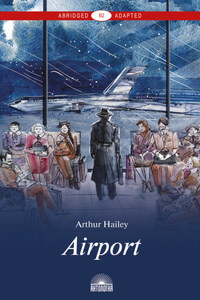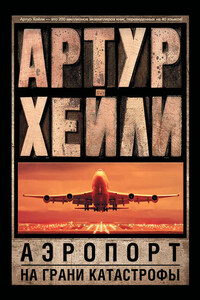At half-past six on a Friday evening in January, Lincoln International Airport, Illinois, was functioning, though with dififculty.
The airport was reeling from the roughest winter storm in six years. The storm had lasted three days. Now, trouble spots were erupting steadily.
A United Air Lines food truck, loaded with two hundred dinners, was lost somewhere on the airport perimeter. A search for the truck had so far failed to locate either the missing vehicle or its driver.
United’s Flight 111 – a non-stop DC-8 for Los Angeles, which the food truck had to service – was already several hours behind schedule. Similar delays, for varying reasons, were affecting at least a hundred flights of twenty other airlines using Lincoln International.
Out on the airfield, runway three zero[1] was out of use, blocked by an Aéreo-Mexican jet – a Boeing 707 – its wheels were deeply stuck in wet ground beneath snow, near the runway’s edge. Two hours of intensive efof rt had failed to make the big jet moved. Now, Aéreo-Mexican had appealed to TWA[2] for help. Air Trafifc Control[3] had limited the volume of incoming trafifc. Despite this, twenty incoming flights were stacked up overhead, some of them were nearing low fuel limits. On the ground, forty planes were preparing for takeoff. But until the number of flights in the air could be reduced, ATC[4] had ordered further delays of departures.
In the main passenger terminal, chaos predominated. Terminal waiting areas were jammed with thousands of passengers from delayed or canceled flights. Baggage, in piles, was everywhere.
High on the terminal roof, the airport’s immodest slogan, LINCOLN INTERNATIONAL – AVIATION CROSSROADS OF THE WORLD, was completely obscured by snow.
“The wonder was,” Mel Bakersfeld thought, “that anything was continuing to operate at all.”
Mel, airport general manager – lean, tall, disciplined and energetic – was standing by the Snow Control Desk, high in the control tower. He peered out into the darkness. Normally, from this glasswalled room, the entire airport complex – runways, taxi strips, terminals, trafifc of the ground and air – was visible. But tonight only a faint blur of a few nearer lights penetrated the snow.
At the Snow Control Desk near Mel, Danny Farrow – at other times an assistant airport manager, now snow shift supervisor – was calling Maintenance Snow Center by radiophone.
“We’re losing the parking lots. I need six more Payloaders[5].”
Danny was seated at the Snow Desk, which was not really a desk at all, but a wide, three-position console. Confronting Danny and his two assistants – one on either side – was a battery of telephones and radios. Surrounding them were maps, charts, and bulletin boards recording the state and location of every piece of motorized snow-fighting equipment, as well as men and supervisors. The Snow Desk was activated only for its one seasonal purpose. At other times of year, this room remained empty and silent.
Mel Bakersfeld was aware that conditions were awful. An hour ago, Mel had driven across the airfield. He used service roads, but although he knew the airport layout very well, tonight he had trouble finding his way and several times was almost lost. Mel had gone to inspect the Maintenance Snow Center and then, as now, activity had been intensive. Where the tower Snow Control Desk was a command post, the Maintenance Snow Center was a front line headquarters. From here, weary crews and supervisors came and went, alternately sweating and freezing.
Like the Snow Desk in the control tower, the Maintenance Snow Center was activated for its winter function only. It was a big room above an airport truck garage, and it was presided over by a dispatcher.
The maintenance foreman’s voice came on the radiophone again. “We’re worried about the lost food truck too, Danny. The poor driver could freeze out there. Though if he isn’t foolish, he isn’t starving.”
The UAL[6] food truck had left the airline flight kitchen for the main terminal nearly two hours ago. Its route lay around the perimeter track, a journey which usually took fifteen minutes. But the truck had failed to arrive, and obviously the driver had lost his way. United flight dispatch had first sent out its own search party, without success. Now airport management had taken over.
Mel said, “That United flight finally took off, didn’t it? Without food.”
Danny Farrow answered without looking up. “I hear the captain put it to the passengers[7]. Told them it’d take an hour to get another truck, that they had a movie and liquor aboard, and the sun was shining in California. Everybody voted to get out. I would, too.”
Mel nodded, resisting a temptation to take over and direct the search himself for the missing truck and driver. He was glad, a moment later, that he had not interfered. Danny was already doing the right thing – intensifying the truck search. The missing driver must be saved first.















